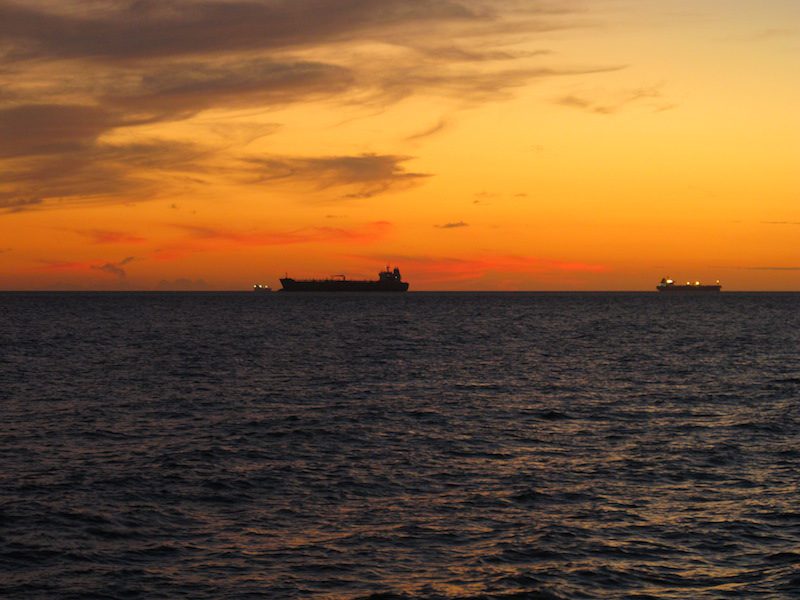UK Strikes at Heart of Russia’s Arctic Energy Empire
New maritime services ban threatens to sever lifeline for Yamal LNG exports By Paul Morgan (gCaptain) – In the frozen waters above the Arctic Circle, a fleet of specialised ships...

Ships at anchor off Curacao
HOUSTON, Nov 13 (Reuters) – Venezuelan oil ports are struggling to load and unload cargoes on time amid an increase in fuel imports prompted by trouble at PDVSA’s 1.3 million-barrel-per-day domestic refining network, shippers told Reuters on Thursday.
PDVSA is offering to buy up to 2.4 million barrels of gasoline and ultra low-sulfur diesel to be received as of November 17, its biggest fuel purchase since an explosion in 2012 affected its main refinery. Firms such as BP, Noble Group and Vitol are lining up to sell the cargoes.
Cargoes from up to ten oil and fuel orders the firm made in October are also causing traffic. Some of those include crude being imported from Algeria after a supply contract was recently signed with state-run Sonatrach to use Saharan Blend light crude as a diluent for Venezuela’s growing extra heavy oil output.
“There are at least 20 oil tankers around Pozuelos Bay (at Venezuela’s Eastern coast) waiting to load and unload at Jose terminal, compared to a normal figure of 10-15 tankers,” a shipper close to PDVSA’s purchases said.
Venezuela’s has a vast oil infrastructure that also includes several terminals in the Caribbean, but its capacity to receive and handle oil imports is limited.
“PDVSA is rushing to solve logistical problems and be able to receive all imports at its terminals in the coming days, avoiding extra freights and waiting costs,” the source added.
PDVSA expects its main complex, the Paraguana Refining Center (CRP), will restart its main units on Thursday, after power outages last week halted Amuay and Cardon refineries.
The Caribbean area has been increasing fuel imports in recent weeks amidst a growing demand from companies such as Venezuela’s PDVSA, Dominican Republic’s Refidomsa, Jamaica’s Petrojam and Colombia’s Ecopetrol.
A total of 359 oil tankers were sailing or moored in the Caribbean on Thursday, compared to 352 in the U.S. Gulf Coast, according to Reuters vessel tracking system.
Tanker Transsib Bridge coming from New York with up to 300,000 barrels of clean products is waiting to unload at Cardon. Tanker Dreggen coming from Rotterdam is delivering products at the same terminal, according to vessel fixtures.
At least another five gasoline cargoes and a ULSD cargo were booked already to sail from Europe to Venezuela or the Caribbean, according to traders, including the BW Panther handled by Vitol going to Saint Eustatius.
The very large crude carrier (VLCC) Carabobo with Venezuela’s first crude import arrived to Jose on Oct. 25 but it only delivered 700,000 barrels of Saharan Blend there, according to PDVSA’s internal import and export report, and another portion of the oil was delivered in Saint Eustatius.
The tanker was loaded again in Jose on Wednesday with Merey 16 heavy crude and it is scheduled to arrive to Curacao on Friday, another source added.
Venezuela’s second crude import on tanker Boston will arrive to Jose on Nov. 17 with up to 2 million barrels more of Saharan Blend and two cargoes of Russian Urals crude will be delivered at PDVSA’s Curacao terminals during November. (Additional reporting by Libby George in London; Editing by Terry Wade and Andrew Hay)
© 2014 Thomson Reuters. All rights reserved.

Sign up for gCaptain’s newsletter and never miss an update

Subscribe to gCaptain Daily and stay informed with the latest global maritime and offshore news
Essential news coupled with the finest maritime content sourced from across the globe.
Sign Up